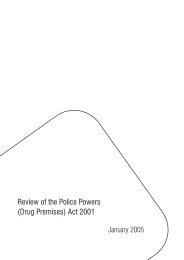Crimes (Forensic Procedures) Act 2000 - NSW Ombudsman - NSW ...
Crimes (Forensic Procedures) Act 2000 - NSW Ombudsman - NSW ...
Crimes (Forensic Procedures) Act 2000 - NSW Ombudsman - NSW ...
Create successful ePaper yourself
Turn your PDF publications into a flip-book with our unique Google optimized e-Paper software.
Table 2 shows the rate at which forensic procedures were conducted in each region during the first four years of the<br />
<strong>Act</strong>’s operation.<br />
Table 02: <strong>Procedures</strong> conducted on suspects and volunteers by region.<br />
Region<br />
Population of region*<br />
<strong>Procedures</strong> conducted<br />
on suspects and<br />
volunteers**<br />
Rate of forensic<br />
procedures conducted<br />
per 100,000 of the<br />
region population<br />
Inner Metropolitan 1,584,297 2,971 188<br />
Greater Metropolitan 2,108,993 3,326 158<br />
Southern 1,938,394 1,046 54<br />
Northern 1,014,010 1,597 157<br />
Western 477,364 880 184<br />
* Region population is the total of the relevant local area command populations, according to <strong>NSW</strong> Police. <strong>NSW</strong> Police based its figures on<br />
the 2001 census data.<br />
** <strong>Procedures</strong> conducted on suspects and volunteers reflects the total number of forensic procedures conducted on suspects and volunteers<br />
between 1 January 2001 and 31 December 2004. These figures represent the total number of forensic procedures conducted and not the<br />
number of individual persons undergoing forensic procedures. They do not include forensic procedures conducted<br />
by specialist commands.<br />
Source: <strong>NSW</strong> Police Intranet as at 16 February 2005.<br />
Table 2 shows that, as expected, a very small proportion of the population in each region underwent a forensic<br />
procedure during the review period. Southern Region conducted significantly fewer forensic procedures per capita<br />
(54 per 100,000) than the other regions (between 157 and 188 per 100,000). 340<br />
<strong>NSW</strong> Police also has a number of specialist commands, which are not attached to a particular geographic area.<br />
Some of these conduct forensic procedures, for example the State Crime Command (which focuses on organised<br />
crime, fraud, child protection and sex crimes, homicides and other operations), the <strong>Forensic</strong> Services Group, the<br />
Counter Terrorism Command, the Firearms Registry and the Professional Standards Command. We have included<br />
forensic procedures conducted by specialist commands in our overall statistical analysis, but not in the regional<br />
analysis.<br />
5.2.1. Difference between metropolitan and regional areas<br />
Metropolitan police are conducting significantly more forensic procedures than regional police. This would be<br />
expected, given there are more people and higher levels of crime incidents recorded in metropolitan areas. However,<br />
it also appears that distance and a lack of appropriate facilities in some regional police stations may contribute to<br />
lower numbers of forensic procedures. We also found that some regional commands may prefer to rely on more<br />
traditional policing methods, rather than wait for long periods for DNA analysis results which constitute the vast<br />
majority of forensic samples. 341<br />
We also found that many police officers are quite reluctant to conduct forensic procedures, which in some areas has<br />
contributed to a low level of use of the powers available under the <strong>Act</strong>. For example, one commander we interviewed<br />
said that in his command, which is in a rural area, there had so far been only one DNA match, and no eliminations,<br />
despite the <strong>Act</strong> having been in force for several years. He realised that officers were conducting very few forensic<br />
procedures, even though there were many occasions where suspects fit the criteria. He attributed this to a lack of<br />
confidence among officers and the length of time it takes to conduct a procedure. 342 We found this reluctance to<br />
conduct forensic procedures in both metropolitan and regional areas, but it appears that its effect is less pronounced<br />
in metropolitan areas as there are generally more officers who are willing to conduct procedures.<br />
60<br />
<strong>NSW</strong> <strong>Ombudsman</strong><br />
DNA sampling and other forensic procedures conducted on suspects and volunteers under the <strong>Crimes</strong> (<strong>Forensic</strong> <strong>Procedures</strong>) <strong>Act</strong> <strong>2000</strong>

















